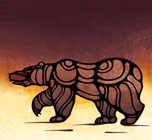Seven Sacred Teachings
The Seven Sacred Teachings, also known as the Teachings of the Seven Grandfathers, is a set of teachings on human conduct towards others. They are what was traditionally and still is to this day needed in order for communities to survive.
While we recognize that not all First Nations, Métis and Inuit cultures and histories recognize The Seven Sacred Teachings or the Teachings of the Seven Grandfathers our intention is to be as inclusive as possible.
Role of Elders
Our Elders carry the history of our communities and the roots of our culture. They provide us with wisdom, guidance, direction and encouragement. They teach us about respect, trust, honesty, love, humility, courage and truth. We hold the Elders in high regard and will approach them for help, advice and support as we provide services to children, youth, families and communities.
Importance of Language
Language is the keystone to cultural identity and to the preservation of culture. Kunuwanimano strives to communicate whenever possible using our First Nations languages, both verbally and in written materials with the children, youth, families and communities we serve.
Culture
Kunuwanimano is committed to providing services that is respectful of the cultural heritage and traditions of the First Nations. We recognize that each First Nation community is unique and our service model will respect those differences.
Customary Care
We are respectful of traditional customary practices of caring for children and we will uphold the traditional customs in how we organize and deliver child welfare, prevention, and support services. We will develop a model of Customary Care to preserve family unity and build upon the vision of a shared community responsibility of caring for and raising healthy children.
Holistic Service Paradigm
Indigenous culture is rooted in an understanding of the integral connection of body, mind, heart and spirit. Holistic practice flows from this foundation of understanding. Kunuwanimano is committed to provide services from within a holistic service paradigm that integrates this knowledge. We will provide services that are strength based, optimistic, affirming and empowering for children, youth, families and communities with participatory decision making involving families, extended family, Elders and the community.
Diversity and Bi-Cultural Practice
Kunuwanimano recognizes the diversity among First Nations and we understand each is unique, with different strengths, needs, resources and aspirations. Our service model will be designed to respect these differences and to promote First Nations responsibility and participation in decisions affecting their children and youth.
While some people within the different communities choose to embrace Indigenous spiritual practices, others have chosen to follow Christian traditions. Others still, choose not to follow any one spiritual path.
Different traditions have different approaches to healing, counselling, and treatment. Bi-cultural practice means Kunuwanimano will respect and access traditional Indigenous healing ceremonies and practices, as well as mainstream assessment and treatment, depending on the needs and desires of the children, youth, and families we serve.
Repatriation
Kunuwanimano’s Board of Director’s wishes to be proactive in partnership with the First Nations in developing a model to repatriate children and youth lost to the communities through adoption or permanent long term care in the Child Welfare system. The intent is to help strengthen the communities and begin to heal the wounds from the past.
Kunuwanimano is committed to assist in the development of a repatriation treatment and support service model in partnership with the communities.
Reclamation
First Nations reclamation of responsibility for ensuring the safety and well-being of children, youth and families is supported by Kunuwanimano.
In our interventions we are committed to providing services from a “best practice approach” and we will engage children, youth, families and communities in the intervention process. Such an empowering process will ensure child safety and well-being is sustained.
We will work in collaboration with the communities to develop the resources and supports to redress child maltreatment through a collaborative process and by sharing with communities when we are aware of “promising practices” in other First Nations.
Early Intervention, Prevention, Treatment and Support Programs
Kunuwanimano is committed to providing early intervention, treatment and support services to communities to prevent child maltreatment, and to strengthen and support family functioning.
Kunuwanimano is committed to assessing the needs in the communities and advocating for the resources to deliver needed services.

 Kunuwanimano is rooted in the fundamental value of respect. We acknowledge that to show respect entails the obligation to share and give of ourselves in the provision of services.
Kunuwanimano is rooted in the fundamental value of respect. We acknowledge that to show respect entails the obligation to share and give of ourselves in the provision of services. Kunwanimano understands this value to mean that we must always be ready to acknowledge our limitations and to be mindful of the equality of all peoples and to never abuse our authority. We strive to place the needs of children, youth and families and communities ahead of our own and we will provide needed services to our First Nations.
Kunwanimano understands this value to mean that we must always be ready to acknowledge our limitations and to be mindful of the equality of all peoples and to never abuse our authority. We strive to place the needs of children, youth and families and communities ahead of our own and we will provide needed services to our First Nations. Our respect for the children, youth, families and communities we serve is reflected in our commitment to honesty. We are committed to be truthful in our interactions with others, to be open and direct in our communications. We will follow through on our commitments. We will listen and we will hear what our children, youth, families and communities say and we will incorporate their views in the planning for services.
Our respect for the children, youth, families and communities we serve is reflected in our commitment to honesty. We are committed to be truthful in our interactions with others, to be open and direct in our communications. We will follow through on our commitments. We will listen and we will hear what our children, youth, families and communities say and we will incorporate their views in the planning for services. Courage involves demonstrating we have the emotional and moral strength to do what is right. We honor the capacity of the First Nations who display courage in the face of difficult situations that have threatened their traditions, culture and language. We accept our responsibility to help empower the communities we serve and to support and meet their needs in ways that will facilitate the growth and development of children, youth, families and communities.
Courage involves demonstrating we have the emotional and moral strength to do what is right. We honor the capacity of the First Nations who display courage in the face of difficult situations that have threatened their traditions, culture and language. We accept our responsibility to help empower the communities we serve and to support and meet their needs in ways that will facilitate the growth and development of children, youth, families and communities. First Nations people express love for the Creator and all of creation. There is a special obligation to protect and love children who are gifts from the Creator. Kunuwanimano knows that each of us must experience love and caring. This all important value obliges us to show kindness and compassion in our dealings with others and to work toward a state of harmony in all areas of life.
First Nations people express love for the Creator and all of creation. There is a special obligation to protect and love children who are gifts from the Creator. Kunuwanimano knows that each of us must experience love and caring. This all important value obliges us to show kindness and compassion in our dealings with others and to work toward a state of harmony in all areas of life. We recognize that everyone is endowed with gifts that can be used to build peaceful and healthy families and communities. We understand that wisdom is earned by taking time to reflect on everything we experience and recognize that life constantly presents us with opportunities to acquire new perspectives, insights and skills as we interact with our colleagues, children, youth families, communities’, teachers, and Elders. We recognise that everyone needs compassion and support to grow and to learn new ways of managing issues and concerns.
We recognize that everyone is endowed with gifts that can be used to build peaceful and healthy families and communities. We understand that wisdom is earned by taking time to reflect on everything we experience and recognize that life constantly presents us with opportunities to acquire new perspectives, insights and skills as we interact with our colleagues, children, youth families, communities’, teachers, and Elders. We recognise that everyone needs compassion and support to grow and to learn new ways of managing issues and concerns. Living the truth is living the Seven Sacred Teachings, living from the heart. Kunuwanimano will be truthful in their interactions with children, youth, families and communities.
Living the truth is living the Seven Sacred Teachings, living from the heart. Kunuwanimano will be truthful in their interactions with children, youth, families and communities.